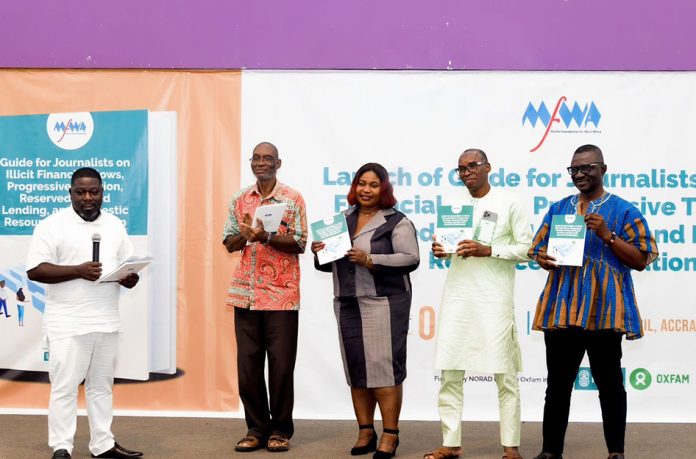The Media Foundation for West Africa (MFWA) launched their “Guide for Journalists on Illicit Financial Flows, Progressive Taxation, Reserved Based Lending and Domestic Revenue Mobilisation,” to assist journalists in reporting on economic justice.
The New Guide, which was funded by the Norwegian Agency for Development Cooperation and OXFAM in Ghana was unveiled on Friday, August 1st, 2025 at the British Council in Accra.
The 14 chapter document includes investigation approaches, case studies and ethical guidelines. The guide offers concise definitions, real-world case studies, investigative tips, ethical guidelines, and resource checklists.
Its development was supported by NORAD and Oxfam in Ghana under the “Tax for Development: Strengthening Civil Society and Media for Fiscal Justice” project.
In a speech delivered on behalf of Sulemana Braimah, Executive Director of MFWA, by Senior Programme Manager, Rosemond Ebi-Adwo Aryeetey, he highlighted the critical role of the media in demanding accountability, especially around financial crime.
Mr. Braimah noted that IFFs cost Ghana millions of cedis, resources that could otherwise support essential social services.
“Yet journalists often face knowledge gaps and resource constraints when investigating these complex issues,” he said.
He further explained that the guide includes critical checklists and resources to help journalists navigate the challenges of reporting on sensitive financial crimes.
The Vice President of the Ghana Journalists Association (GJA), Rebecca Ekpe, on her part urged journalists to take a more active role in exposing illicit financial flows and improving domestic revenue mobilisation.
Addressing the gathering, she emphasised that the media must play a central role in advancing economic justice. She described the guide as a “valuable resource” that equips journalists with the tools and best practices to investigate financial crimes and tax evasion issues she said are depriving the country of vital resources for development.
Sharing a personal observation from her hometown of Tema, Madam Ekpe questioned the disappearance of market vendors who appear at night and vanish by morning, raising concerns over uncollected taxes.
“That’s a lot of money going down the drain,” she said, stressing the need for accountability at the local level.
She commended MFWA and Oxfam for the collaborative effort and called on journalists to use the guide to expose wrongdoing, inform public discourse, and amplify the voices of the marginalized.
“Together, we can build a more transparent, equitable, and prosperous Ghana,” she concluded.









